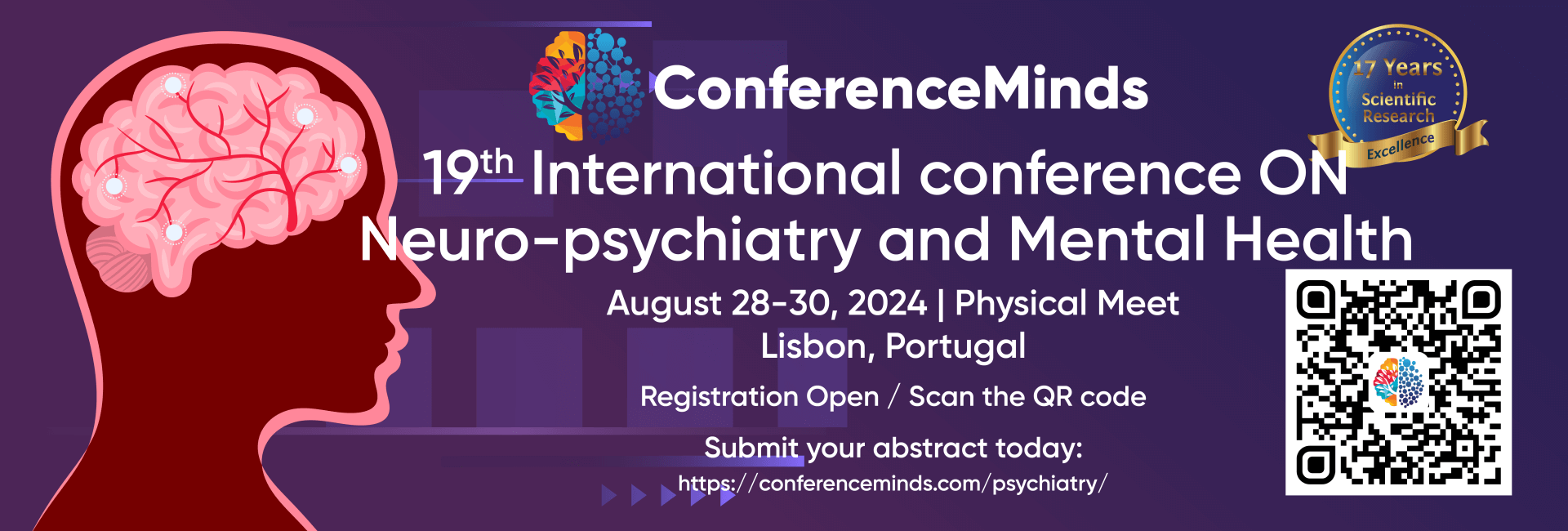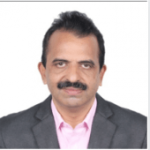
19th International conference
ON
Neuropsychiatry and Mental Health
Event Date
August 28-30, 2024
Venue
Lisbon, Portugal
– Previous Conference Performers / Professionals From Around The Globe –

Aikaterini Ziaka
- Physio4you, Greece

AMR Hawal
- Professor, Prime Healthcare Group UAE

Antonio Steardo
- University of Salerno, Italy

Ashraf Lotfy Fayed
- ENT Military Hospital, Egypt

Aspazija Sofijanova
- Director of Pediatric Clinic, Macedonia

Brandon P. Lucke-Wold
- University of Florida, Florida

Brankica Vasiljevic
- NMC Royal Hospital, UAE

Bruce Ogden
- Director of Operations US Foods USA

Cornelia Beyer
- University of Hull, UK

Grazzia Rey
- University of the Republic, Uruguay

Heather Carmello
- University of Rochester, USA

Howard Weber
- Penn State Hershey Childrens Hospital, USA

Irene Hamrick
- University of Cincinnati, USA

José De Jesús Curiel Valdés
- Clínical Patology, Mexico

Lloyd L. Tran
- Biomed Industries, USA

Luca Roncati
- University Hospital of Modena, Italy

Maria Braoudaki
- University of Hertfordshire , United Kingdom

Marina F Gubkina
- National Research Medical University, Russia

Peter Krcho
- Pavol Jozef safarik University, Slovakia

Pinghong Zhou
- Fudan University, China

Raffaele Pilla
- University of Salerno, Italy

Ruut Veenhoven
- Seres Therapeutics, United States

Said Moustafa M. El-deib
- Yas Clinic Khalifa City UAE

Sajidxa Marino
- Central University of Venezuela, Venezuela

Sajidxa Marino
- Central University of Venezuela, Venezuela

Sam Vaknin
- Southern Federal University, Russia

Sandra Vélez Candelario
- Catholic University of Puerto Rico, USA

Simon Treissman
- Royal Inland Hospital, Canada

Taylor Bean
- Salmon Arm, Canada

Thiago Hoesker
- Neuro surgeon , Brazil

Tracy Roake
- Danat Al Emarat Hospital, UAE

Vladimir Zajac
- Cancer Research Institute, Slovakia

William J Rowe
- Specialist in Medicine, USA

Yacob Mathai
- Marma Health Centre, India

Yu You Liu
- National Chung Hsing University, Taiwan
Media Partners/Collaborator
A huge thanks to all our amazing partners. We couldn’t have a conference without you!










Sponsors/Exhibitors
A huge thanks to all our amazing partners. We couldn’t have a conference without you!


Neuropsychiatry Conference 2024
Explore the Boundaries of Mental Health: Join Us at the 19th International Conference on Neuropsychiatry and Mental Health
Dive into the dynamic realm of 19th International Conference on Neuropsychiatry and mental health taking place on August 28-30, 2024, in the vibrant city of Lisbon, Portugal. Organized by ConferenceMinds, a leading international event organizer.
About the Conference: Our theme, “Exploring the Possibilities to Treat NeuroPsychiatric, Psychological Disorders, and Mental Health,” serves as the foundation for a gathering of minds from various disciplines. We extend a warm invitation to nurses, psychiatrists, neuropsychiatric professionals, neurosurgeons, neurologists, emergency medicine specialists, international speakers, scientists, researchers, university professors, students, college faculties, and healthcare professionals to share their insights and experiences in this expansive field.
Why Join?
- Interactive Learning: Engage in workshops and interactive sessions where presenters and delegates collaborate on ideas and hands-on experiences. These sessions, including panels, staged conversations, and debates, provide a platform for meaningful interaction.
- Meet Subject Matter Experts: Connect with subject matter experts who will guide you through current research and development, assist with research queries, and ensure the scientific rigor of your work.
- Networking and Round Table Discussions: Our specially designed sessions bring together clinicians, health professionals, and patients to foster learning, collaboration, and the building of professional networks.
Who Can Join? The conference accommodates various participation modes, catering to academic, student, and business categories:
- Speakers: Deliver oral presentations, workshops, special sessions, or symposiums.
- Delegates: Register to access all sessions and benefits.
- Poster Presenters: Showcase your work through posters.
- Remote Attendance: Participate via video or e-poster presentations.
- Exhibitors: Showcase products through exhibitor booths.
- Media Partners, Sponsors, Collaborators: Contribute to the success of the event.
For Researchers & Faculty:
For Universities, Associations & Societies:
For Students & Research Scholars:
For Business Delegates:
- Speaker Presentations
- Symposium Hosting
- Book Launch Events
- Networking Opportunities
- Audience Participation
For Companies:
- Exhibitor and Vendor Booths
- Sponsorship Opportunities
- Product Launch
- Workshop Organizing
- Scientific Partnering
- Marketing and Networking with Clients
Target Audience:
- Psychologists, Psychiatrists, Neuropsychiatrists, Psychotherapists
- Nurse Practitioners
- Professors, Scholars, Directors, CEOs
- Healthcare Professionals
- Nobel Laureates in Health Care and Medicine
- Pharmaceutical Development Companies
- Research Institutes
- Graduates and Postgraduates
- Medical Devices Manufacturing Companies
- Training Institutes
- Business Entrepreneurs
Session Tracks: Explore a diverse range of topics across various session tracks, including Psychiatry, Psychology, Mental Health and Wellness, Brain Injury Medicine, Clinical Psychology, Neuropsychiatry, Addiction, Rehabilitation & Psychotherapy, and many more.
Join us at Psychiatry and Mental Health 2024, where boundaries are explored, connections are made, and the future of mental health is shaped.
Session and Tracks
Track 1: Psychiatry and Psychiatric Disorders
Psychiatry is a medical branch that focuses on mental, emotional, and behavioral disorders. The term “psychiatric disorder” encompasses a broad range of issues affecting a person’s thoughts, feelings, behavior, or mood. Also known as “mental illness” or “mental health conditions,” these disorders can significantly impact one’s ability to function at work or school and maintain healthy social relationships. It’s important to note that psychiatric disorders are medical conditions and not a sign of weakness. Treatment options vary depending on the specific disorder, symptoms’ scope, and severity.
- Anxiety disorders
- Stress disorders
- Major depressive disorder
- Mood disorders
- Eating disorders
- Schizophrenia
- Schizoaffective disorder
Track 2: Brain Disorders
The brain serves as our body’s control center, part of the nervous system regulating everything from senses to muscle function. Brain disorders encompass conditions or disabilities affecting the brain, influencing memory, sensation, and even personality.
Types of Brain Disorders:
- Alzheimer’s Disease
- Dementias
- Brain Cancer
- Epilepsy and Other Seizure Disorders
- Mental Disorders
- Parkinson’s and Other Movement Disorders
- Stroke and Transient Ischemic Attack (TIA)
Track 3: Psychology & Mental Health
Mental health encompasses emotional, psychological, and social well-being, impacting thoughts, feelings, and actions. It is crucial across all life stages, from childhood to adulthood.
Track 4: Counseling & Psychotherapy
Counseling typically addresses short-term issues resolved on a conscious level, while psychotherapy delves deeper into a person’s psychological history for more intensive and extensive treatment.
Track 5: Child and Adolescent Psychiatry
Child and adolescent psychiatry focus on diagnosing, treating, and preventing mental disorders in young individuals, exploring biopsychosocial factors influencing development and treatment responses.
Track 6: Stress, Depression, and Anxiety
Stress, depression, and anxiety are distinct experiences, and individuals may exhibit elements of each without a clinical diagnosis. Consulting a psychologist helps clarify and tailor treatment options.
Track 7: Neuropsychiatry
Neuropsychiatry examines how brain structure and function relate to mental processes and behaviors, contributing to the understanding and treatment of social and intellectual impacts of psychiatric disorders.
Track 8: Autism Spectrum Disorder
Autism spectrum disorder affects brain development, influencing socialization and communication. It involves restricted and repetitive patterns of behavior.
Track 9: Addiction, Addictive Disorders, and Recovery
Addiction, a chronic brain condition, encompasses substance use or compulsive actions despite harmful consequences. Recent definitions include behavioral addictions, highlighting the complexity of the condition.
Track 10: ADHD & Learning Disorders
ADHD involves variations in brain development affecting attention and self-control. Learning disorders impact the brain’s ability to process information. Early intervention is crucial for both conditions.
Track 11: Geriatric Psychiatry
Geriatric Psychiatry addresses mental health issues affecting older adults, including anxiety, depression, dementia, and substance abuse, using a comprehensive approach to treatment.
Track 12: Suicide & Prevention
Suicide prevention efforts aim to reduce risk factors and provide support at individual, relationship, community, and societal levels, emphasizing mental health treatment, improved coping strategies, and fostering hope.
Track 13: Mental Health
Mental health is the holistic well-being of an individual, influencing thoughts, feelings, and actions. Prioritizing mental health is essential for overall wellness.
Track 14: Adult Mental Health
Adult mental health covers various conditions like depression, anxiety, bipolar disorder, affecting emotional, psychological, and social aspects. Treatment options range from therapy to medication and self-care.
Track 15: Child and Adolescents Mental Health
Focused on individuals aged 0-18, child and adolescent mental health addresses issues such as ADHD, autism, anxiety, and depression, emphasizing early intervention and support from parents and schools.
Track 16: Mental Illness
Mental illness includes conditions affecting thinking, mood, and behavior, such as depression, schizophrenia, anxiety disorders, and bipolar disorder. Treatment involves therapy, medication, support groups, and lifestyle changes.
Track 17: Impulse-Control Disorder
Impulse-Control Disorder involves difficulties resisting impulsive urges or behaviors, including intermittent explosive disorder, kleptomania, and pyromania. Treatment may include therapy, medication, and coping strategy development.
Track 18: Neuro-Development Disorders
Neurodevelopmental disorders impact nervous system development, affecting cognition, communication, social interaction, and motor skills. Examples include autism spectrum disorder, ADHD, and intellectual disability. Treatment involves a multidisciplinary approach.
Track 19: Post-traumatic Stress Disorder
PTSD, triggered by traumatic events, manifests as intrusive memories, nightmares, hypervigilance, and avoidance. Treatment includes therapy, such as cognitive-behavioral therapy (CBT), and medication.
Track 20: Bipolar Disorder
Bipolar disorder involves extreme mood swings, from elevated or manic to depressive episodes. Treatment combines medication, therapy, and lifestyle adjustments for mood stabilization.
Track 21: Personality Disorders
Personality disorders feature persistent deviations in behavior, thoughts, and emotions from cultural norms, causing distress. Examples include borderline personality disorder, narcissistic personality disorder, and antisocial personality disorder. Treatment often involves therapy, such as dialectical behavior therapy (DBT) or cognitive-behavioral therapy (CBT).
Market Analysis
The Psychiatry and Mental Health Conference is a pivotal event in the healthcare landscape, providing a platform for professionals, researchers, and experts to converge and discuss the latest advancements, challenges, and trends in the field. This conference plays a crucial role in fostering collaboration, sharing knowledge, and promoting innovation in psychiatry and mental health.
Market analysis of this conference reveals a growing demand for a comprehensive understanding of mental health issues and the need for effective strategies to address them. With the increasing recognition of mental health as a global concern, the conference attracts a diverse audience, including psychiatrists, psychologists, social workers, and policymakers. The market for mental health conferences is expanding as awareness of mental health issues rises, leading to an increased emphasis on research, treatment modalities, and preventative measures.
Key drivers for the growth of this market include rising mental health challenges, the integration of technology in mental health care, and a growing acceptance of holistic approaches. Additionally, the conference serves as a platform for pharmaceutical companies, mental health clinics, and technology providers to showcase their latest products and services.
Overall, the Psychiatry and Mental Health Conference is a vital hub for networking, knowledge exchange, and business development in the mental health sector. As the importance of mental health continues to gain prominence, the market for such conferences is anticipated to witness sustained growth, reflecting the increasing commitment to addressing and mitigating mental health issues on a global scale.
